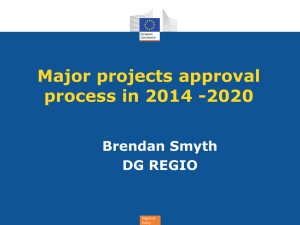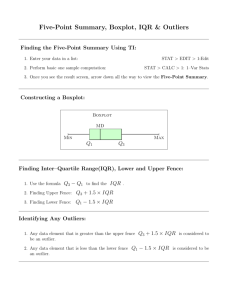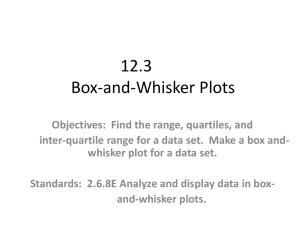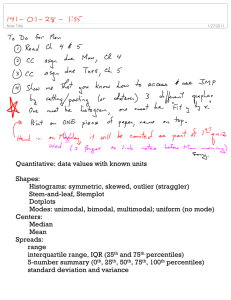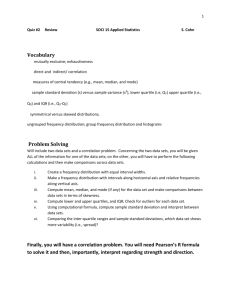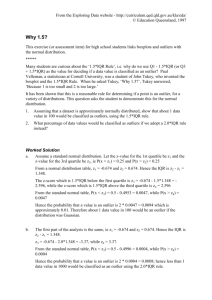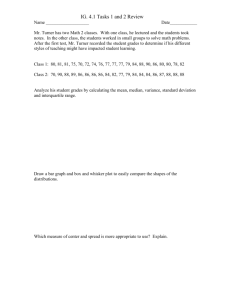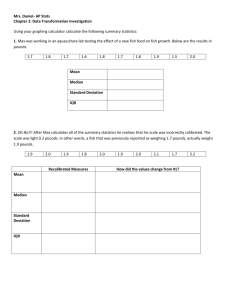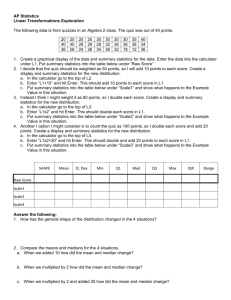2014 04 03 proposed organisation JASPERS 2014
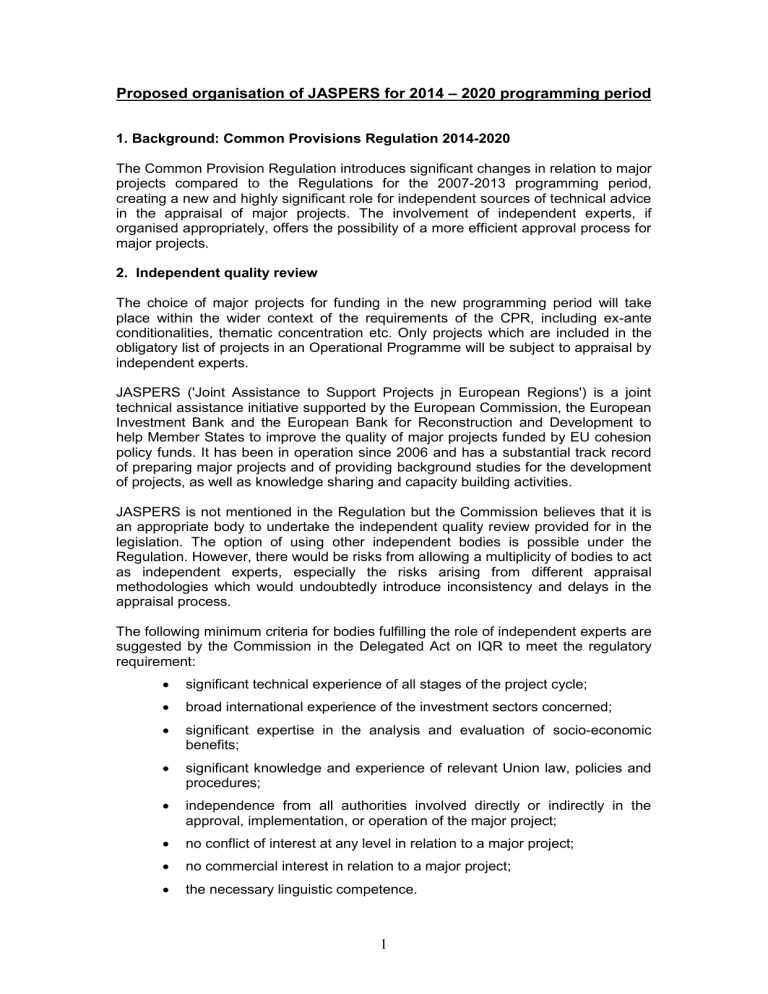
Proposed organisation of JASPERS for 2014
– 2020 programming period
1. Background: Common Provisions Regulation 2014-2020
The Common Provision Regulation introduces significant changes in relation to major projects compared to the Regulations for the 2007-2013 programming period, creating a new and highly significant role for independent sources of technical advice in the appraisal of major projects. The involvement of independent experts, if organised appropriately, offers the possibility of a more efficient approval process for major projects.
2. Independent quality review
The choice of major projects for funding in the new programming period will take place within the wider context of the requirements of the CPR, including ex-ante conditionalities, thematic concentration etc. Only projects which are included in the obligatory list of projects in an Operational Programme will be subject to appraisal by independent experts.
JASPERS ('Joint Assistance to Support Projects jn European Regions') is a joint technical assistance initiative supported by the European Commission, the European
Investment Bank and the European Bank for Reconstruction and Development to help Member States to improve the quality of major projects funded by EU cohesion policy funds. It has been in operation since 2006 and has a substantial track record of preparing major projects and of providing background studies for the development of projects, as well as knowledge sharing and capacity building activities.
JASPERS is not mentioned in the Regulation but the Commission believes that it is an appropriate body to undertake the independent quality review provided for in the legislation. The option of using other independent bodies is possible under the
Regulation. However, there would be risks from allowing a multiplicity of bodies to act as independent experts, especially the risks arising from different appraisal methodologies which would undoubtedly introduce inconsistency and delays in the appraisal process.
The following minimum criteria for bodies fulfilling the role of independent experts are suggested by the Commission in the Delegated Act on IQR to meet the regulatory requirement:
significant technical experience of all stages of the project cycle;
broad international experience of the investment sectors concerned;
significant expertise in the analysis and evaluation of socio-economic benefits;
significant knowledge and experience of relevant Union law, policies and procedures;
independence from all authorities involved directly or indirectly in the approval, implementation, or operation of the major project;
no conflict of interest at any level in relation to a major project;
no commercial interest in relation to a major project;
the necessary linguistic competence.
1
JASPERS is accepted by the Commission as meeting the criteria for an independent quality review body and the Commission has proposed that JASPERS can be made available to all Member States which plan to make use of EU funds to support major projects.
Any other review body proposed by Member States would have to meet the criteria for independence and quality listed above.
Any Member State which does not want to avail itself of the services of JASPERS has the option, as at present, of presenting its major projects directly to the
Commission for approval.
3. JASPERS with two separate functions
It is proposed that in its new structure JASPERS must fulfil two separate functions:
an advice and capacity building function for the current beneficiary Member
States (EU12, Croatia and Greece) which will provide advice about the structuring of projects, extending to the preparation of background strategies, and capacity building via horizontal studies, targeted training, etc. This would include advice about the structuring of individual projects, a service which
JASPERS has provided to Member States since 2006. Extension of advice to other interested Member States is not excluded but this would depend on the availability of resources.
an independent quality review function available to all Member States which plan to receive Union assistance for major projects, in which JASPERS provides the independent quality review required for the notification procedure under Article 102.1 of the CPR.
This implies the creation of a new Independent Quality Review (IQR) division within
JASPERS, while at the same time maintaining the current sectoral divisions on the advisory side.
When both functions are carried out for a project, the second function would be independent of the first, and will be undertaken by the new IQR division within
JASPERS. All projects submitted in the notification procedure will therefore be reviewed by this new division. This does not means that the IQR division will duplicate the work carried out by the advisory function.
The independent quality review would be carried out by a team with sufficient experience of project appraisal to take a different view from the advice units if it believes that this is justified. The IQR division will review the completion report from the advisory function, consult the basic project documents, if required, and discuss as needed in order to have clear understanding of the project and of the outstanding issues (if there are any still remaining). In addition, the IQR will also check if the earlier analysis and quality control work done by the advisory function has been completed in accordance with agreed standards.
There will be a possibility that the opinion of IQR may differ from the conclusions of the advisory function. However, the alignment of methodologies between the two elements within JASPERS should reduce the likelihood of this occurring. The work of the advisory function should also take into account the criteria for the IQR as set out in the Delegated Act. Clearly the dual structure will be most effective in cases where
2
the Member State uses JASPERS both as advisor and as IQR. However, the system can be adapted to other cases and this will be developed further in the scenarios in the following sections.
It is necessary to avoid any conflict of interest (or even the perception of it) between the two functional parts of JASPERS. This means avoiding the risk that the IQR is in some way inhibited from being critical because of associations with the JASPERS advisory part.
The structure of the IQR as a division in the overall organisation of JASPERS allows carrying out its work and producing its opinion independently from the advisory part.
Specific separate reports will be produced for the IQR and the advice parts.
The reorganisation of JASPERS to fulfil these two functions must be operationally efficient and not adversely affect its working methods which both the Commission and the Member States find highly satisfactory. In particular, any unnecessary duplication of activities, responsibilities and functions within JASPERS should be avoided.
With these constraints and principles in mind, the proposed organisation for
JASPERS is illustrated in Annex 1 and the process involved are described in the section below and in annex 2.
4. Advice and IQR units: possible scenarios
The different options provided by the Regulation mean that the involvement of
JASPERS may take a number of different forms:
1. JASPERS provides advice to the Member States (EU12, Croatia and Greece) in relation to a project as well fulfilling the Independent Quality Review function. Extension of advice to other interested Member States which will receive assistance for major projects is not excluded but, as mentioned earlier, this will depend of the availability of resources.
2. JASPERS acts only as IQR.
3. JASPERS provides advice to the Member State (EU12, Croatia and Greece) in relation to a project for which the Member State submits an application for funding of a major project to the Commission for decision.
4. JASPERS provides advice to the Member State in relation to a project but the
Member State uses another body for the IQR function. This is a possible configuration but it is considered unlikely.
5. There may be cases where JASPERS neither provides advice nor acts as
IQR and, in these cases, applications for funding for major projects will be submitted directly to the Commission,.
The most likely scenario is the first case listed above: JASPERS provides both advice and IQR functions. The advice part will be carried out without involvement of the IQR. Nevertheless the work will be carried out in accordance with a standard methodology and applying common quality standards. The methodology to be used is described in detail in the Delegated Act on IQR.
3
The IQR division will receive the file when the corresponding JASPERS advice division has finished its assignment and the Member State provide it (the IQR division) with the final application documents . The IQR division w ould then carry out its detailed objective review and its appraisal of each project, as explained in section 3, to check that the requirements set out in the Commission Delegated
Act have been complied with.
The IQR division will have staff competent to verify whether the Member State has complied with the requirements of the Delegated Act.
In the second case , JASPERS is asked to act as IQR only. In any case where the
IQR does not have sufficient technical capacity to carry out an appraisal, it may draw on the services of the advice side of JASPERS to assist its appraisal. In these cases, the IQR will review (and if needed discuss) the report from the sector division and consult the basic project documents, if needed, as described in the first scenario.
In the third and fifth cases with or without advice from JASPERS , where the
Member State sends an application to the Commission for appraisal and decision, the Member States have already been advised at COCOF during 2013 that it is the
Commission’s intention to make use of the services of the JASPERS which would then request input from the advisory units for the quality check. This is to make use of the proven technical capacity of JASPERS. The IQR will carry out its final review of the work of the advisory units in relation to each project, as in cases 1 and 2, before its report is forwarded to the Commission.
As mentioned earlier, the dual system will work most efficiently in the cases where the Member State uses JASPERS for both advisory and IQR roles.
Annex 2 illustrates the processes involved in each scenario.
5. IQR Report template
The report of an Independent Quality Review body will be in a standard format consistent with that described in the Implementing Act on the format to be used by the Member State for the notification procedure. The report will include clear ‘yes/no’ type of statements without qualifications, ambiguity or grey areas, together with appropriate justification.
Apart from an overall opinion about the proposed project, the IQR will provide an opinion about all major aspects of a proposed project, corresponding to the parts of a project in the up-dated major project application form (e.g. compatibility of project within OP priorities, options analysis, technical aspects, cost-benefit analysis, financial analysis, environmental aspects, state aid etc. etc.) in keeping with the requirements set out in the Delegated Act on the IQR methodology. Again, the report will provide a clear opinion under each heading but with a short description and commentary. Once again, the report will aim for a clear statement about acceptability under each heading without qualifications.
It should be underlined that the IQR report must be clear and explicit in its judgements.
In the event that the IQR rejects a proposal, its report will have text in the overall summary and in the sections of the report explaining which elements of the project are found to be unacceptable, with a short commentary explaining the ‘outstanding issues’ that must be resolved before the project can be considered acceptable.
4
The final IQR report will be signed by the head of the IQR division and the head of
JASPERS. In those cases where there is no IQR involved and only advice, the report (currently called the Action Completion Note) will be signed by the head of the corresponding advisory division and the head of JASPERS.
JASPERS' reports to the Steering Committee will include a specific report of the activity within the IQR function and the different heads of division will be present at meetings of the Steering Committee as required by the Head of JASPERS.
The template for an IQR report is annexed to the Delegated Act about IQR. To ensure standardisation, all future reports whether prepared by the advice or IQR divisions and whether for the Member States or for the Commission, will follow this model.
6. Disclaimer
The IQR report will contain a statement concerning the legal liability of JASPERS for the IQR. The wording will be agreed following legal advice.
The provision of an independent quality review report from the IQR unit with an opinion about the acceptability of an investment proposal does not substitute for the responsibility of the Member States to ensure compliance with EU legislation .
7. Size of IQR and profile of staff
It is not intended that the IQR division should duplicate the work of the advice divisions but, nonetheless, the team in this division must have a comprehensive understanding of project appraisal and what is critical in terms of deciding the acceptability of projects for EU support.
The IQR division must have expertise available to cover all investment sectors in which EU funding supports major projects. The team should be capable of commenting in all aspects of the project cycle, especially the cost benefit analysis, environmental aspects, procurement plan and state aid.
The expert staff and the head of the IQR division should have sufficient experience to be able to discuss projects with their correspondents in the advisory divisions, as explained in section 3, will not necessarily repeat the work already carried out by those units.
In cases where Member States choose both the advisor and the IQR function of
JASPERS, JASPERS will try to avoid duplication of work while observing the requirements set out in the Delegated Act.
8. Relations between advisory and IQR units
It is essential for internal planning purposes within the IQR that it is aware of the flow of future project proposals for appraisal. Accordingly, in cases where JASPERS acts in both the advisory and IQR role, the IQR team will be made aware of which projects are within Action Plans for each Member State, the nature and timing of each assignment concerning individual projects and will be made aware of progress during each assignment, including preliminary reports about the projects.
5
In the case of disagreement between the opinions of an advisory division and the
IQR division an in depth examination of the issues concerned will be undertaken under the responsibility of the Heads of JASPERS.
The IQR division will draft its final report about a project without further reference to the advisory divisions and transmit it to the Member State concerned.
9. Quality Assurance Unit
Outside the advisory and IQR divisions, there will be a small Quality Assurance unit which will function rather like an internal review unit, checking, on a sample basis, that the correct processes and methodologies are being used and providing the liaison about methodological issues with the Commission.
10. Networking platform
It is intended that the activities of the networking platform for capacity building and spreading knowledge and best practice will be expanded. An interactive part of the
JASPERS open only to members with an access code web-site will be added to the current JASPERS website and will be operational shortly.
6
Annex 1: Organisation chart
Head of Division
Quality
Assurance
Steering committee
Director
Head of JASPERS
Head of Unit: Coordination,
Planning & monitoring
Information system
Budget & administration
Head of Division
Independent
Quality Review
Head of
Division Water and Waste
Head of Division
Knowledge
Economy and
Energy
Head of Division
Air, Maritime and
Public Transport
Head of
Division
Roads
Networking platform
A A
IQR Advisory Units
7
Annex 2: JASPERS role within four paths for the approval of major projects
Case 1: Member State is advised by JASPERS and uses JASPERS as IQR
The key steps would be as follows:
1. The Member State requests the assignment to be added to the Action Plan
(AP), which will clearly indicate the nature of the JASPERS support (e.g. advisory plus IQR). For the IQR, bilateral agreements with the Member States shall be concluded.
2. The responsible sector division in JASPERS will carry out the advisory activity in a similar manner to the current programming period.
3. Once the advisory part completed, the sector division in JASPERS will produce a Completion Note in a format that covers also the requirements of the IQR report. This Completion Note will be co-signed by the head of the sector division and the head of JASPERS and it will be sent simultaneously to the Member State and the IQR division. At this stage the Member State should have provided JASPERS with all the information required by the
Regulation for the IQR.
4. The IQR division will review the report from the sector division and consult the basic project documents, if required, and discuss with this division as needed in order to have clear understanding of the project and of the outstanding issues (if there are any still remaining). Then the IQR division will discuss the outstanding issues with the Member State before finalising the IQR report.
5. After the issues are solved, the head of the IQR division will co-sign the IQR report with the head of JASPERS and the report will be sent to the Member
State.
6. The Member State sends the IQR report, together with the basic project information required by the Regulation, to the Commission. The application will be deemed to be approved within three months of the date of notification unless the Commission rejects the application within the time allowed on the basis of a significant weakness in the experts' report.
The flow chart summarising this case is the following:
8
Case 2: Member State uses JASPERS as IQR only
1. A bilateral agreement concerning IQR shall be concluded with the Member
State. The Member State provides all of the information required by the
Regulation to the IQR division of JASPERS.
2. Any application which does not provide all of the information required by the
Regulation for starting the independent quality review will be rejected by the
IQR and the Member State will be informed accordingly. When, on the basis of the information provided by the Member State, the IQR can judge that the project is evidently incapable of being improved within a reasonable time to stand a chance of being submitted to the Commission, either for approval or for notification, it will reject the project for quality review and inform the
Member State accordingly. Such course of action should be specified in the bilateral agreement.
3. If required, the IQR division can transmit the documents to the relevant sector division in the advisory side to carry out an appraisal and produce a report summarising the conclusions.
4. The IQR division will review the report from the sector division and discuss with this division as needed in order to have clear understanding of the project and of the outstanding issues (if any still remaining). Then the IQR division will discuss the outstanding issues with the Member State before finalising the report.
5. After the issues are resolved, the head of the IQR division will co-sign the IQR report with the head of JASPERS and the report will be sent to the Member
State.
9
6. The Member State sends the IQR report, together with the basic project information required by the Regulation, to the Commission. The application will be deemed to be approved within three months of the date of notification unless the Commission rejects the application within the time allowed on the basis of a significant weakness in the experts' report.
The flow chart summarising this case is very similar to the previous case, with the only difference that the request from the Member State is for the IQR report and not for advice. Therefore, the project is not added to the Action Plan (which covers advice only).
Case 3: Member State asks JASPERS for advice and submits application to the
Commission for appraisal
1. JASPERS adds the assignment to the Action Plan and carries out the advisory function as in the current Programming Period. At the end of the assignment, JASPERS sends a Completion Note to the Member State that is co-signed by the head of the corresponding sector division and the head of
JASPERS. Following receipt of a completion report from the advisory part of
JASPERS, the Member State provides all of the information required by the
Regulation to DG REGIO, acting for the Commission. No involvement of the
IQR division takes place at this stage. The process up to here is summarised in the flow chart below:
10
2. DG REGIO checks the application to ensure that all of the information required has been provided. Any application which does not provide all of the information required by the Regulation or which is evidently deficient and incapable of being accepted for funding will be rejected by the Commission and the Member State will be informed accordingly.
3. Following the initial assurance that the application is admissible, the documentation could be transferred to the IQR division of JASPERS for appraisal, to be drafted following the standard template of an IQR report. The
IQR will involve the advisory side of JASPERS as required, as in the previous case.
4. The IQR division sends the IQR report in the standard format to the
Commission with a positive or negative judgement about the proposal.
5. The Commission, following appraisal by DG REGIO and other DGs, via interservice consultation, decides whether or not to approve the application for funding. This is summarised in the flow chart below, which complements the previous one:
11
Case 4: Member State asks JASPERS for advice but wishes to use independent experts other than JASPERS as IQR
This is theoretically possible but is a very unlikely configuration. In cases where a beneficiary Member State has asked for JASPERS advice to structure a project, DG
REGIO would expect JASPERS to act as IQR also.
Case 5: JASPERS neither provides advice nor acts as IQR
Where the MS submits the application to the Commission for appraisal, the procedure will be as for the steps 2 to 5 in Case 3.
12
13
14
